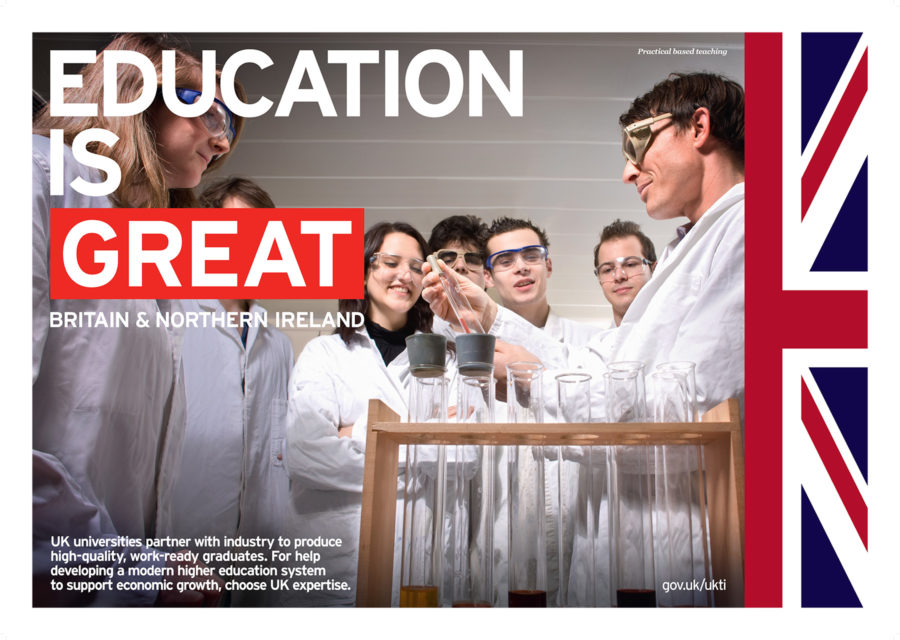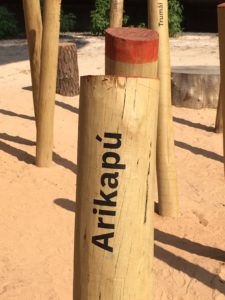Greening the Macedonian environmental behaviour: Let’s try a proven approach
Skip to content Besart Ljachi
Chevening Scholar
Guest blogger for UK in North Macedonia
Part of Chevening Conversations UK in North Macedonia
3rd December 2019 Skopje, North Macedonia
Greening the Macedonian environmental behaviour: Let’s try a proven approach It is that time of the year again. The air gets foggy and our vision blurry, but ironically, this is the time when we can clearly see (and smell) our most critical issue. According to the World Health Organization, around 2,574 deaths annually can be attributed to the air pollution. In addition, the World Bank has calculated a 250 million EUR price tag that this problem brings to our economy, which represents a cost equal to significant 3.2% of the GDP.
In a true reflection of Chevening values, the Macedonian Chevening Alumni Association achieved to bring its expertise and network into play, aiming to address this grave issue. The “Greening Western Balkans’ Environmental Behaviour” conference approached environmental behaviour f..
Floods
Skip to content Chris Trott
UK Ambassador to South Sudan
Part of UK in South Sudan
28th November 2019 South Sudan
FloodsImagine you are living in a country that is facing a major humanitarian crisis and a civil war. And then it starts raining. Not for a day or two but solidly, for months. The town you are living in, with a population of around 40,000 people, is one of the poorest and most remote in the country, and is situated on a flood plain. Gradually the water rises and you realise that unless you act quickly nothing is going to survive.
So you abandon your home, build a series of mini dykes round the three highest spots in the town and then frantically try to prevent them from being breached as the water level slowly peaks. And then it sits there, for weeks on end. And you are crammed into the space of a school yard with 7,000 others trying to survive. But every journey involves waist deep water and a trudge through mud of the consistency of treacle. Everyone in the town is affec..
Floods in Pibor
Skip to content Chris Trott
UK Ambassador to South Sudan
Part of UK in South Sudan
28th November 2019 Juba, South Sudan
Floods in PiborImagine you are living in a country that is facing a major humanitarian crisis and a civil war. And then it starts raining. Not for a day or two but solidly, for months. The town you are living in, with a population of around 40,000 people, is one of the poorest and most remote in the country, and is situated on a flood plain. Gradually the water rises and you realise that unless you act quickly nothing is going to survive.
So you abandon your home, build a series of mini dykes round the three highest spots in the town and then frantically try to prevent them from being breached as the water level slowly peaks. And then it sits there, for weeks on end. And you are crammed into the space of a school yard with 7,000 others trying to survive. But every journey involves waist deep water and a trudge through mud of the consistency of treacle. Everyone in th..
Greening Western Balkans’ Environmental Behaviour
Skip to content Frosina Antonovska
Chevening Scholar
Guest blogger for UK in North Macedonia
Part of Chevening Conversations UK in North Macedonia
28th November 2019 Skopje, North Macedonia
Greening Western Balkans’ Environmental Behaviour When it comes to tackling any of the environmental threats that humanity is faced with today, the first key challenge is to raise the awareness of the problem and the need for change of behaviour. This is a worldwide quest, and definitely not unique to the Western Balkan region. However, it is evident that Western Balkan countries are lagging behind in this process, and that they have many common issues to overcome.
That is why we decided that the focus of the annual Macedonian Chevening Alumni Association (MCAA) conference this year should be exactly “Greening Western Balkan’s environmental behaviour”. We tried to tackle the key environmental awareness raising drivers from all relevant perspectives, beginning with the classical approach, and closi..
FINDING PULSARS: RADIO ASTRONOMY & SPACE SCIENCE OUTREACH IN RURAL CHINA
Skip to content Alasdair Hamilton
Head of Science and Innovation Team, British Embassy in Beijing
Part of Global Science and Innovation Network
28th November 2019 Beijing, China
FINDING PULSARS: RADIO ASTRONOMY & SPACE SCIENCE OUTREACH IN RURAL CHINAThe FAST Radio Telescope“The greatest danger facing us is ourselves, and irrational fear of the unknown. There is no such thing as the unknown. Only things temporarily hidden, temporarily not understood.”
If you can identify this quote and who said it then you have done well. If not you may be surprised. I’ll come back with an answer to that at the end of this blog.
There a lot to take way from these words, particularly the last three. Space does provide an irrational fear of the unknown, though mainly in the form of Sci-Fi in books, films and TV shows. It’s usually what gets children interested in space – I know I did through watching Star Wars and Star Trek. But children do have a wonderful curiosity about them and getting them intereste..
Climate change and plastic free environments – we are all responsible to #ActGreen
Skip to content UK in North Macedonia
Part of #BeyondPlastic UK in North Macedonia
18th November 2019 Skopje, North Macedonia
Climate change and plastic free environments – we are all responsible to #ActGreen Introduction by Her Majesty’s Ambassador Rachel Galloway, British Embassy Skopje:
Climate change presents an existential risk to global prosperity & security, and I am proud that the UK are leading in the fight to protect our environment. This year, we have become one of the first major economies to commit to ending our contribution to climate change altogether by reducing our emissions to net zero by 2050. This is consistent with the science of what is needed globally to avoid dangerous climate change. The next Climate Change Conference (COP25) will take place in December and we will post a series of environmental related blogs by some guest bloggers to share information & ideas. Next year, the UK has successfully bid to co-host with Italy the 2020 Climate Change Conference (COP..
British education: major visa reform for post-study visas
Skip to content Leigh Turner
Ambassador to Austria and UK Permanent Representative to the United Nations and other International Organisations in Vienna
Part of UK in Austria
4th November 2019 Vienna, Austria
British education: major visa reform for post-study visas I commend a recent British Council blog, written by Education Director Maddalaine Ansell.
Ms Ansell writes about the major reform to post-work study visas for international students which the UK Government has announced will enter into force from 2020. “From next year,” she writes, “students graduating from British higher education institutions with at least an undergraduate degree can apply to stay for two years to work or seek work. If they find skilled work, they can switch into the skilled workers immigration route, which can lead to permanent settlement in the UK.”
The change will not directly affect Austrian students, who can already study in the UK for courses starting in the 2020-21 academic year on the same basis ..
The Government Art Collection in Vienna
Skip to content Leigh Turner
Ambassador to Austria and UK Permanent Representative to the United Nations and other International Organisations in Vienna
Part of UK in Austria
31st October 2019 Vienna, Austria
The Government Art Collection in Vienna The Duke of Wellington stares across the room towards a distant Queen Victoria, while Emperor Franz Josef – sash, ‘tache and all – observes impassively. Not the plot of a historical novel, but the paintings in the dining room at the ambassador’s residence in Vienna.
Works from the Government Art Collection (GAC) are displayed in UK Government buildings in nearly every capital city, making it the most dispersed collection of British art in the world.
The Collection promotes British art and plays a key role in British cultural diplomacy, delivering an expression of Britain’s culture and its values. Nowhere is this more relevant than in Vienna, a city where appreciation of art and culture flows through everyday life; and where our continuing ..
Mostar deserves better
Skip to content Matt Field
British Ambassador to Bosnia and Herzegovina
31st October 2019 Sarajevo, Bosnia and Herzegovina
Mostar deserves better The British Embassy recently moved its whole operation down to Mostar for a day. In addition to many other activities across the city, we set up a ‘pop-up’ reception in front of the Mepas Mall. This gave the chance for different teams to explain our work – defence cooperation, education, projects, scholarships, consular support, political work, and commercial – to people as they stopped by.
Just as importantly, it gave us the chance to ask the citizens of Mostar about their priorities for themselves and the city, the kinds of things that they would like to see change. This is a question we as an Embassy have been asking ourselves and others since I arrived, to try to make sure that our priorities and assistance programmes properly match with the change people in this country want to see. The citizens of BiH are the best judges of how to imp..
MIND YOUR LANGUAGE
Skip to content Paul Brummell
Head of Soft Power and External Affairs Department, Communication Directorate
30th October 2019 London,UK
MIND YOUR LANGUAGE The Indigenous Peoples’ Memorial is one of the many striking buildings in the Brazilian capital designed by the prolific modernist architect Oscar Niemeyer. Built in a spiral-shaped design around a central courtyard it was apparently inspired by a Yanomami house. In truth, the building is looking a little the worse for wear. The permanent collection was closed when I visited while on holiday in August, but it was still a worthwhile visit, thanks to a display in that central courtyard, installed to commemorate the UN designation of 2019 as the International Year of Indigenous Languages.
Entitled “the Forest of Indigenous Languages”, from the sand-covered courtyard sprouted many wooden poles, each representing a different indigenous language. The poles were of varying heights, since to a standard-height base had been added an addition..









